Text
Blog Post #16
1. Strauss was influenced by the death of his composer friend Gustav Mahler who died and then Strauss wrote the Alpine Symphony while he was moruning (this is really sad) and he named it “antichrist” after the book written by Nietzche. He was also influenced by Beethoven which shared some composition themes with his Symphony no. 6. This author, however, makes the contention that Strauss went beyond Beethoven and was able to create almost a visual experience for the listener through his composition. Wagner was also an influence on this symphony, like the way it begins from almost one tone and then grows together slowly.
2. I’m sorry for my lamen terms, but I can tell that any beginner horn player would struggle playing this piece. The description of the journey that the instrumentation is intended to take the listener on is long and winding with a lot of inversions and other changes of the various melodies. This piece, I’m sure, is exhausting to play.
3.

4. Nacht (Night): 0:00
Sonnenaufgang (Sunrise): 3:26
Der Anstieg (The Ascent): 4:50
Eintritt in den Wald (Entry into the Forest): 7:09
Wanderung neben dem Bache (Wandering by the Brook): 12:34
Am Wasserfall (At the Waterfall): 13:22
Erscheinung (Apparition): 13:35
Auf blumigen Wiesen (On Flowering Meadows): 14:25
Auf der Alm (On the Alpine Pasture): 15:20
Durch Dickicht und Gestrüpp auf Irrwegen (Through Thickets and Undergrowth on the Wrong Path): 17:34
Auf dem Gletscher (On the Glacier): 19:02
Gefahrvolle Augenblicke (Dangerous Moments): 20:04
Auf dem Gipfel (On the Summit): 21:27
Vision (Vision): 26:07
Nebel steigen auf (Mists Rise): 29:41
Die Sonne verdüstert sich allmählich (The Sun Gradually Becomes Obscured): 29:58
Elegie (Elegy): 30:48
Stille vor dem Sturm (Calm Before the Storm): 32:34
Gewitter und Sturm, Abstieg (Thunder and Tempest, Descent): 35:24
Sonnenuntergang (Sunset): 39:13
Ausklang (Quiet Settles): 47:29
0 notes
Text
the rest of Lohengrin: Act II
This act was very boring because of the stage setting and also the actions, or more like lack of. Which of course, I expected because this is how the book Wagner Without Fear said it would be. Alivia and I tried to search Lohengrin on youtube and the first thing that came up was another version of Lohengrin that was produced in this blue lighting too, which I remember you commenting on in class. I will say that Elsa and Lohengrin’s wedding was odd. I can never tell who Ortrud is right away, I’m not even sure if that lady in all black was supposed to be Ortrud, but I am just guessing. I suppose they are putting her in all those eccentric outfits on purpose, so I should just start assuming. I liked Elsa’s wedding dress, I said, “if I were going to wear that kind of wedding dress I would only wear it on stage during an opera”. I don’t like who plays Lohengrin. Also, maybe this is just the style of operas but, I feel like it’s only boring because there’s not much acting, its just singing and standing there. It makes sense considering the amount of effort it takes to hold out such long notes. Anyway, I’m excited for Act III, I hope the action is more entertaining.

0 notes
Text
Blog Post #15
Wagner, Isreal, and the Palestinians
In this first reading, they first introduced the genius of Wagner’s music, then went on to introduce his anti-semitic beliefs and finally introduced the discussion regarding the debate of playing Wagner’s music in Isreal. They make the argument that by continuing to outlaw Wagner’s music in Isreal it is like giving in and letting Hitler have the last word.
To a degree, I understand this argument because I can imagine that Hitler would’ve been selfish with such great German music as composed by Wagner and he himself might’ve called for the banning of Wagnerian compositions being played in a place the Jewish race claimed as their own. He might of asserted that they didn’t deserve it or something, and if that was the case then I would say hell yeah let’s defy Hitler’s wishes and let’s not exclude Jew’s from things as amazing and Wagner’s works.
But on the other hand, I approach this conversation with cultural lenses trying to understand this dilemma, for example, today there are a lot of accusations made about various artists regarding their behavior and beliefs and if something surfaces that goes against what I think is right and fair, such as R Kelly’s sexual assault charges, I have actively chosen to disown his most famous songs. I think this is an ok practice even if the song is extremely influential. As for Wagner’s music, this argument can’t be made so lightly because of how genius and innovative he truly was. But yet, I still think his very outspoken beliefs kind of warrants that his music should be selectively played and not in places that were the target of his disdain.
Divorcing music from anti-Semitism, Israeli soprano takes on taboo at Wagner-fest
In this reading, my first point made above was asserted by one of the Jewish artists performing at Wagner’s festival; Wagner wanted a Jewish cleansing and by performing his works it’s kind of like nuts to him, ya know? I think we just have to ask ourselves if his beliefs can be expunged on the basis of his genius and innovative music advancements. It’s just hard to imagine that we can say we’re actively working against Wagner’s beliefs by encouraging Jews to perform and enjoy his music when we’re bringing more attention and praise to him. To me, this is kind of saying “look we know what you believed and it’s not ok but it’s kind of ok because we still like your music”, I just don’t think much is being done to condone his beliefs although he deserves it. For this reason, I feel kind of slimy that we’re going to his opera because I don’t really want to support someone that was so actively and vocally anti-semitic. I definitely think that when introduced Wagner should be first labeled an anti-semite and second a genius composer, so that people can actively make the choice whether to support someone like that. I’m not saying we should throw out all Wagnerian improvements made to music and theater, but his additions should be taken with consideration and we can’t ever stop condemming him for his beliefs. Nuts to Wagner.
Wagner and Me
1. Stephen Fry also grapples with the question of whether or not to take Wagner’s music as it is and for the genius it is or to always engage with the disdain that he was a vocal anti-semite. He comes to the conclusion that he doesn’t want the music to be lost in a shroud of hate and he actively chooses to enjoy Wagner’s art. I can understand his argument that we shouldn’t let his hate win and we shouldn’t lose the genius of his music to the Nazi’s but I still face a bit cognitive dissonance over the whole matter. I suppose I’ll have to see if seeing his opera is worth it at the end after I’ve seen it in person.
2. I learned a few things from this little documentary;
First, I learned that I recognize more of Wagner’s compositions then I thought I did.
Second, I hadn’t known, although I’m not really surprised that, Wagner’s relatives still are head directors in production of his operas in Bayreuth.
Third, after seeing his grave, I realize they might of made it in honor of his original opera house in Bayreuth...., plain, simple, intended to not take away from the genius within. (;
Fourth, that really awful writer guy, Wagner’s son-in-law, supported and even endorsed Hitler to the Wagner’s when he was first emmerging in German politics.
Finally, the Ring Cycle is 18 hours long in its entirety (17 if you take a nap!).
“Lohengrin” chapter
1. The chapter says that the opera is based on myths incorporating archetypes from the medieval fairytale time, such as knights, kings, witches, magic swans, kings, and damsels in distress.
2. I think it is possible that Wagner saw himself as Lohengrin, because Wagner described him as an artist, a higher being, somewhat above the world, but not exempt from the need of love. Looking at Wagner’s life we know that he quite enjoyed the ladies and also considered himself to be a great artist on his own accord even without the confirmation of the masses. I think it’s possible he was projecting how he felt about himself by creating a character such as Lohengrin.
3. An overture incorporating themes from the entire opera, where a prelude does not, a prelude stands on its own and is more so beautiful than meaningful in the sense of introducing the opera’s themes.
4. Elsa is on trial for the murder of Gottfried, because she goes in the woods with him and returns without him.
5. It seems to me that the only note of the location that Telramaund and Ortrud are banished to is the courtyard of Antwerp Castle, the location of the opera, which makes sense because it would be hard to create two distinct locations on a stage and still have the characters interact with each other. (Although a lot of opera asks the audience to use a bit of imagination, perhaps this was too much of a stretch)
6. Elsa wants to know Lohengrin’s name because she feels that by not even getting to know his name she is somehow below him and that if she is below him then he very well may get bored of her and may leave her for someone else.
7. Ortrud drops dead because she is shocked when Gottfried transforms back from being a swan.
8. Lohengrin kills Telramaund in one blow in his castle room. Ortrud is a pagan, meaning she practices witchcraft. Elsa falls lifeless when Lohengrin leaves on his swan boat after announcing his name.
9. The joke about Kaiser Willhem II being photographed in full swan knight drag or the joke about the actor missing his paper mache swan boat during one of the performances? both funny stories.
10. I’m most excited for elaborate sets, and to see how they project the swan boat (lowkey I hope they use a real swan or like a fleet of real swans) and also to see how the actor of Ortrud portrays the part.
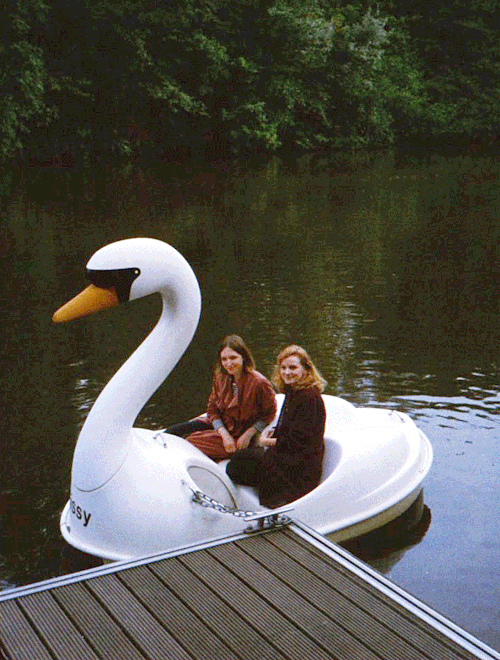
1 note
·
View note
Photo
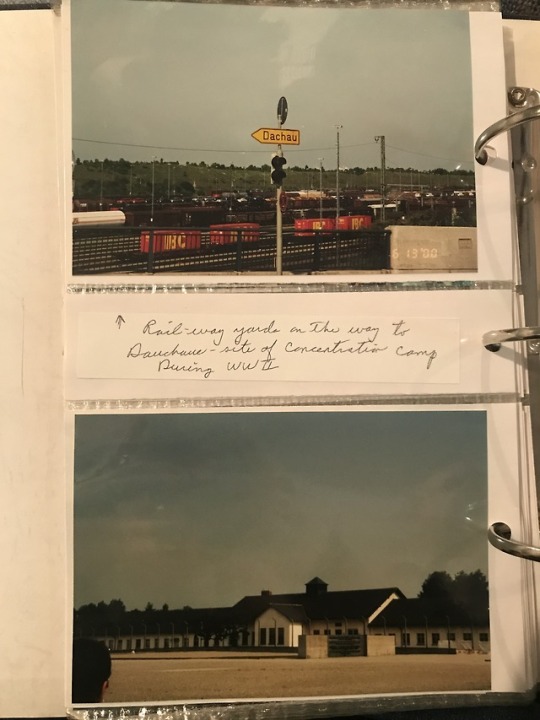
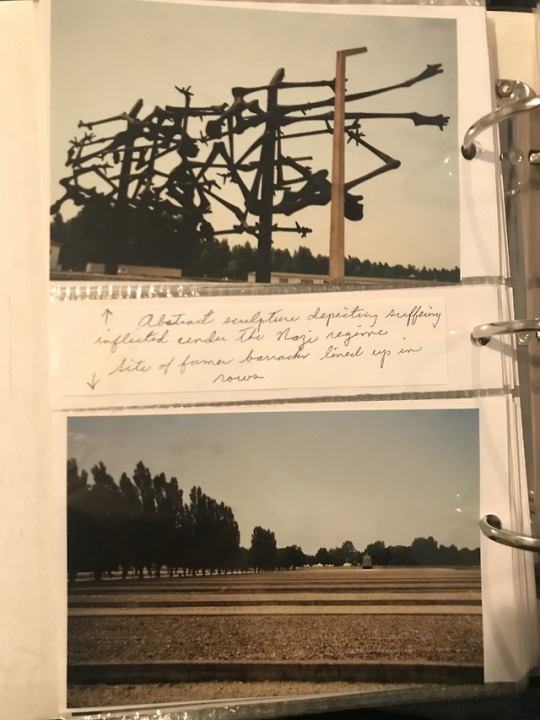
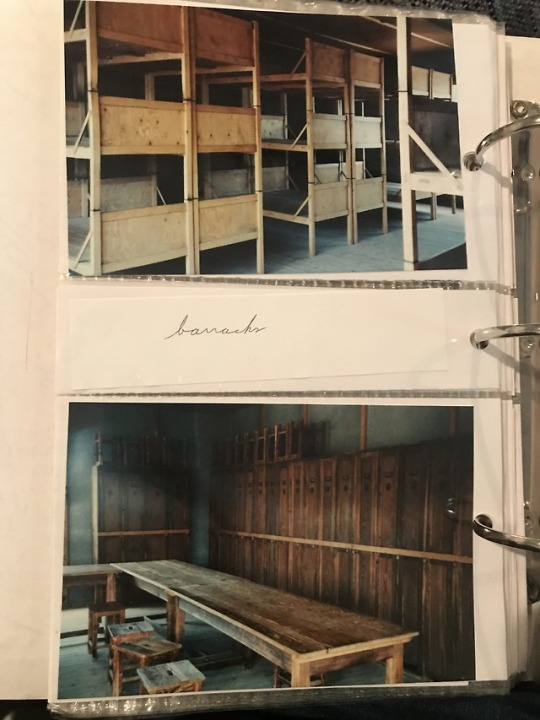
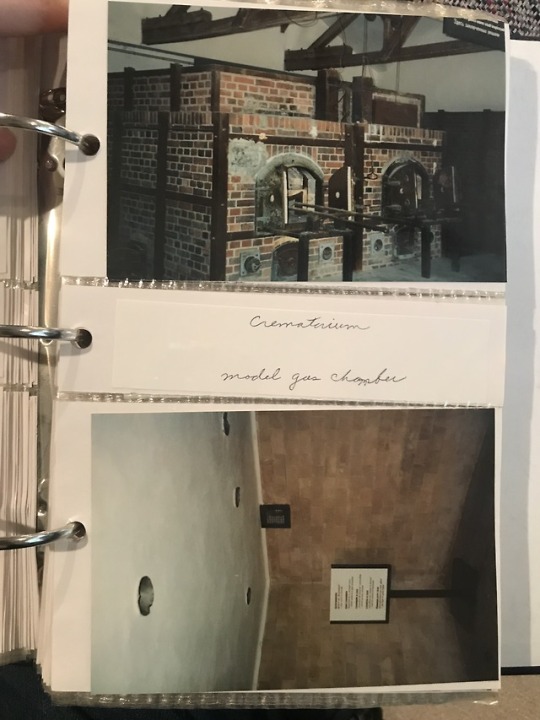

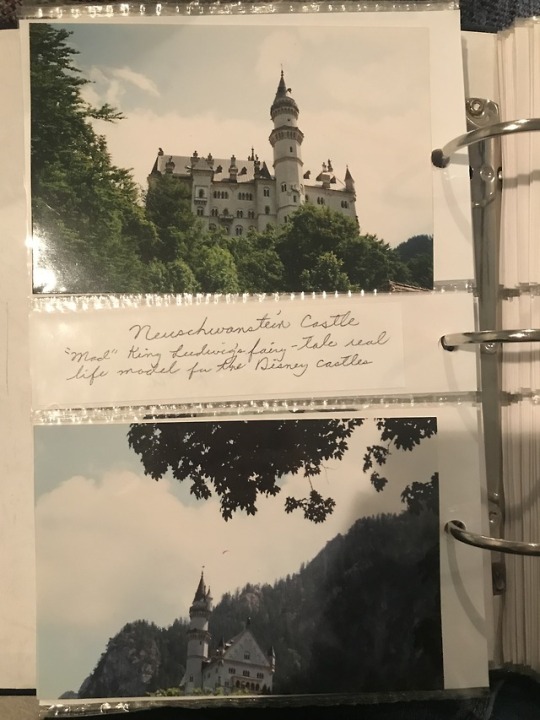
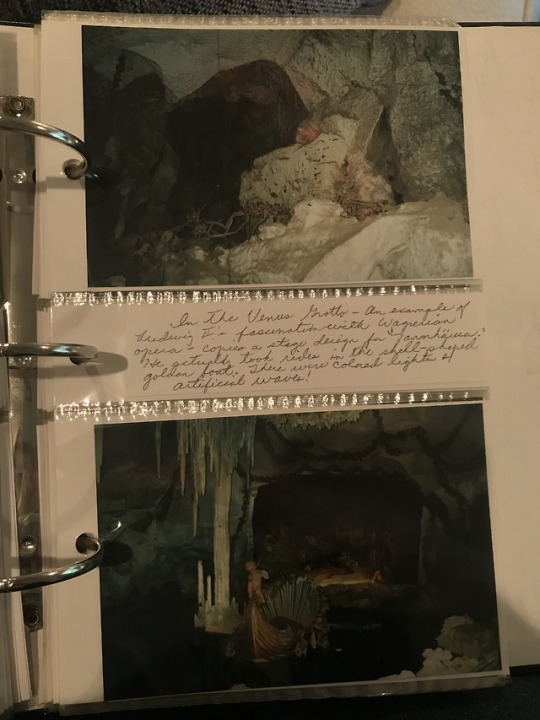

Pictures from my grandmother’s album from when she went Germany in 2000. Looks like we’ll be visiting a lot of the same places! I can’t wait to recreate the last photo!
3 notes
·
View notes
Text
Blog Post #14
Judaism In Music
I’m not sure what the criteria is for being a “true antisemite” but I definitely feel by reading this essay from Wagner that it really showed his true antisematic colors. I think he had a very particular take on his hatred for Jews, which his of course, stemmed from a critique on their ability to make art and perform music. I think he was just jealous of the attention that other Jewish artists at the time were receiving. He really just wanted all the attention for himself.
He complained about the Jews native language, and claimed that it was like gibberish and it made them hard to talk to and take seriously. Their language, he claimed, also made it hard for them to produce poems. But he said they could produce music because music didn’t require language. He comments on Mendelssohn’s ability to write music and attributes it to him copying Bach’s work (he also kind of throws shade at Bach and makes it seem like he wasn’t much a musical genius after all). He also talked about Heine saying that his poems were lies set to music by composers.
If I was a Jewish musician of the time I would not enjoy being in the company of Wagner. I’m sure I would face some cognitive dissonance like I do now, struggling between appreciating his works and judging and distrusting him for his beliefs. But honestly, if he had all this animosity for my race and even printed work talking about how artistically inept I was, I would probably throw the same judgement right back at him, and try to find flaws in his works. If I worked for him I would probably consider getting a different job, even if I loved music, I wouldn’t want to work for someone like him.
Wagner’s Contributions
The beginning of the article talks about Wagner’s changes to the stage space. Basically, before Wagner, the stage set up was not viable for a large audience, not everyone would get the same view, some people wouldn’ t get a view at all. He encouraged framing, extension of the frame, wedge seating, a darkened auditorium, and a pit for the orchestra. All of these changes influenced the way spectators could watch and enjoy a performance, it made it easier to focus on the stage and every seat in the house could better see the stage. The framing was an interesting change because it gave the stage more depth and enabled the actors to interact with the scene and look like they were actually in the scene, not just in front of it. All of the theaters I’ve ever been in boast these changes that can be traced back to Wagner’s innovation. As for movies, by changing the color of the theatre walls themselves and also the lighting reminds me of many movie theatres today that are darkly colored and have very low lighting throughout the show. By putting the opera in the pit, it took the focus away from the musicians and toward the stage, while still encouraging ample sound to be washed over the audience.

0 notes
Text
Blog Post 12
Ludwig II
1. It seems to me that Ludwig II tried to form relationships with many women, but struggled to find anything that made him happy. He was even engaged to his cousin, Sophie, but broke off the engagement because he was worried he would not be forever happy with her, which he wrote about in his letter to Cosima. Following this, he had a few more relationships but he never settled down into one. It’s possible that he is gay and was attempting to force himself into loving women but simply could not get himself to do it and that why he backed out of so many relationships
2. Wagner wanted to befriend the king because he promised to take care of Wagner financially.
3. Ludwig first encounter Wagner’s work in his great uncle’s library. He read his philosophical work about the future of music.
4. Lohengrin
5. Wagner left Munich, Germany for Tribschen, Switzerland. He left because Ludwig asked him to because Ludwig had been discussing politics with him and had passed some of Wagner’s ideas to the council and Wagner had asked Ludwig to dismiss Pfi and Pfo and the monarch gave Ludwig the ultimatium of choosing between his council subjects or his friend. Ludwig chose to keep Pfi and Pfo for the time and asked Wagner to leave Munich to let the suspicions die out.
6. Wagner gave the rights to Ludwig for one of his operas this meant that Ludwig could say when they performed it even if it was not necessarily ready yet. It came back to haunt Wagner because Ludwig had Wagner’s operas preformed against what he wanted.
7. No, because Ludwig was already seriously in debt at this point and shouldn’t have been spons0ring anymore construction projects at this point.
8. Ludwig used a lot of quotes from famous authors which would’ve made it hard to know what his true intentions were. It seemed like he was just hiding behind his words and didn’t want to come right out and say what he was feeling. I’m not sure if this changed my answer to 1, I still think that Ludwig’s romantic life was fueled by his quest to be happy.
9. Neo means new, I think all of the castles that have anything to do with Wagner and his operas are highly interesting. I think they’re interesting because it gives concrete confirmation of Ludwig’s love and appreciation of the arts and especially of Wagner. It’s really cool that he even dedicated Neuschwanstien to Wagner. He really really loved the guy and I just think their friendship is so cute.
10. In the end, Ludwig built up 14 million marks in debt because of his extensive and elaborate castle agenda.
Wagner without Fear
1. It’s like a musically inclined theater preformance, with compositions and singing. It has a ton of emotion in every song so the audience can really place themselves in the characters shoes. Operas create empathy in their watchers.
2. I would say we need to go into the performance already knowing kind of what is happening in the opera, but maybe not the conclusion so we don’t spoil the ending for ourselves. If we know what is going to happen in the opera then at least if we can’t understand what they’re saying we aren’t entirely lost. We can also read the libretto that we will be given when we walk in.
2 notes
·
View notes
Text
Blog Post #11
Ludwig II

1. Otto, who was later renamed Ludwig II after grandfather, was born August 25, 1845. He took the throne on March 10, 1864, meaning he was only 19 years old.
2. At the beginning of his reign it seemed like he cared a lot more. He was described at attending to his duties with diligence. He also made changes almost immediately to his cabinet showing his interest in the government. His signature is even on 100,000 of government related documents from the time period. However, it seems as his life went on he grew more and more disengaged from his work, taking time to himself in the mountains, avoiding obligations.
3. Wagner was first mentioned in the second chapter, when Ludwig fired two council people that worked for his father because they insulted Wagner who was his favorite composer. Ludwig also wrote to Wagner, when Ludwig needed courage to travel the country to meet his people. Wagner gave Ludwig advice.
4. I think this relationship with the Hungarian actor Josef Kainz was kind of cute, at least for the most part. I could tell that this is when Ludwig really came into his appreciation of the arts. It was also pretty cool that Ludwig made Kainz special jewlery and took him on vacations with him. I know there are speculations that Kainz and Ludwig had a romantic relationship and it is definetly possible, but because of the time period it will likely never be uncovered that they were officially engaged in a romantic relationship. However, when Ludwig had Kainz travel with him to the Alps, they found things they simply didn’t have in common and unfortunately at the end of their trip they lost some of their spark. However, Ludwig still had him perform to him after the trip. If anything Ludwig really enjoyed Kainz’s company and they were probably good friends.
5. The book described that the king was agianst the war in 1866 and argued for armed neutrality. However, I found particularly interesting that he took a lot of interest visiting the soilders that had been wounded during the war and even started a fund to support them called the “Bavarian Society in Support of Invalids”. When the Franco-Prussian war started he eagerly sent 55,000 of his troops in to support of Prussia. However he was much more bored with this war and didn’t even take time to visit the troops, instead he stayed in his mountain house.
6. At the end of the Franco-Prussian war Bavaria was integrated into the diction of the German national state under the Prussian leadership. However, Ludwig maintained some of Bavaria’s independencies such as their ability to retain military control in times of peace and independent laws concerning marraige.
7.
Engineering/ Physics
In the chapter where it discusses “The Business of Reigning” it talks about his appreciation for the upcoming science in the time. He incooperated electricity, iron, glass, and even telephones into his castles (which we know he built a lot of). The chapter also talked about how he was fascinated with the idea of flight and although it had not beed discovered yet he thought it was possible. This is what some claimed played into his “mental illness” diagnosis because people of the time thought he was crazy for believing in something so impossible.
The Arts
In the chapter where it Discusses Ludwig’s time in France it mentions him going to many operas like Don Carlos, and Romeo and Juliet at the Grand Opera in Paris. In the chapter discussing his time in Switzerland it mentions how he became a big fan of actors (Kainz) repeating lines to him from plays. Also when they were in Switzerland, the king requested that 14 alphornist come and play them songs (lol, fourteen, that must’ve been loud).
These examples show Ludwig’s appreciation for the sciences and the arts in Europe at the time.
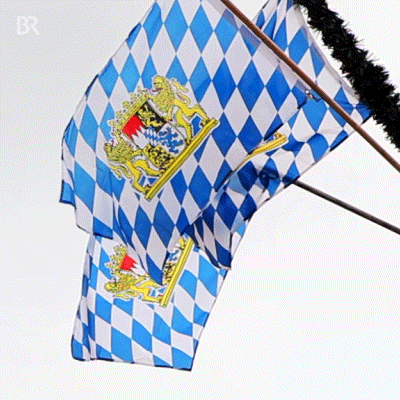
0 notes
Text
Blog Post #10

1. brass family
2. conical
3. it’s made from wood. tapering trees, they grow that way!
4. The music on page four appears really old because they didn’t use the same notes that we see on music today. And it also appears that it is monophonic.
5. the herdsmen played the alphorns to soothe their cows during feeding, milking, and storms. In the winter when their cows were dead (rip) they went into the cities and played their alphorns for money for food. (the part about the cows was so cute oh my gosh).
6. there are three movements but the alphorn doesn’t play in one of them because apparently, the harmonics in this movement didn’t sound good on the alphorn to classically attuned ears. It sounded fine to the cows, but not to the music snobs of the time.
7. because it was banned from being played for the troops because it made them homesick and cry and die. Also, Calvin banned all music and instruments because it was the work of the devil. Even organs were torn and melted down.
8. The governor of Bern wanted to create a bridge between the upper and lower classes and wanted educated them academically and culturally so he hired a guy to make 6 Alphorns and go through the town and offer to teach people how to play.

Here we see a cute cow hiding behind a future alphorn, his favorite instrument.
1 note
·
View note
Text
This video is super cute and maybe we could watch it in class sometime!!
Musc 304
1 note
·
View note
Text
Blog Post 9
1. Documentary
During WWII great Jewish musicians much like great Jewish scientists were not exempt from the discrimination and imprisionment because of thier race. Often times Jewish musicians hid their instruments in an attempt to save them from being taken by the Nazis. German Gestapo took Alice’s husband away from her and later she and her son were taken to a concentration camp. However, they were allowed to compose music and perform in the camp because the generals appreciated the music and knew that they were going to die soon so they let them. I could see this being a different story if the generals at the camp hadn’t been musically inclined or if they were jerks.
2. Biography Notes & Questions
The first guy we read about, Wilhelm Furtwangler, was actually a decent human being in terms of “Non-Jewish” and “Nazi Party supporting” during WWII. He supported the Nazi party because of the surge of support for the arts the Nazi party promised. This he thought would increase job security and pay for struggling musicians. He, however, did not support the excommunication of all Jews from participating in the arts and was an avid opponent to the anti-Jew movement.
The next guy we read about was Richard Strauss who was a popular composer at the time of the World Wars. He also had friends and colleagues who were Jewish. He also wanted to support the Nazi’s because they promised economic stability for musicians. Although, he did not want to Aryanize the German music world. However, he liked Hitler because he praised him as being in the line of great German composers. Unfortunately for his professional career, Strauss talked badly about Nazi Germany in a letter and lost his job and credibility. He spent the rest of his life protecting his family and his Jewish daughter-in-law from persucution.
The next Non-Jewish musician we read about was Herbert von Karajan was an extremely successful musician who was described as having vague political convictions that enabled him to escape long-lasting scrutiny post-WWII. He was scrutinized during the war however by the Nazi party for marrying a girl with a successful Jewish grandfather. Immediately after the war due to his voluntary entry into the Nazi party he was condemned and banned from performing, but that ban was later lifted because he did not perform any actions in support of the party.
The fourth guy we read about, Carl Orff, was a musician who wrote music that was favored by Nazi Germany. However, he was able to avoid scrutiny by emphasizing the negative comments on his work by them after the war among other things. He was a leftist who had Jewish affiliations. However, he never resisted the Nazi movements. To maintain good standing in the community he even sympathized with someone the movements and wrote music for the Hitler Youth. He also stopped communications with his old Jewish friends. After the war, he avoided deNazification by fabricating involvement with an anti-Nazi group. (This guy is a scam and a bad guy in my opinion)
Finally, Paul Hindermith, a musician, who was married to a Jewish-women and had many Jewish friends, was not liked by the Nazis. He struggled to find opportunities to play. He ended up moving to Switzerland and then the US where he was met with professor job at Yale and great opportunities to perform.
A. Based on these articles I think that Furtwangler, Strauss, von Karajan, and Hindermith were the most innocent of collusion during WWII despite all being Aryan. Some of them did have some affiliation with the Nazi party, yet they all were advocates of not supporting the final solution. They all even had either Jewish friends, or wives/families. The guy who is guilty of supporting Nazi Germany, in my opinion, is Orff because he did things in support of Nazi Germany to help him further his own success, he did not at all speak out against the regime and he even excommunicated his Jewish friends.
B. In regards to the scientists, the parallels I see is that many of them wanted to create a safe, nourishing environment for their discipline and thus that led some to support Nazi politics because of the promise of financial support and admiration and advancement. However, many of them felt that the overall politics (final solution) were extremely wrong and often spoke out against it through resigning from their positions or moving away.
0 notes
Text
Blog Post 8
*Disclaimer*
I’m sorry this is so long, I got carried away and I enjoyed learning new things about someone I’ve grown up referencing, but never knew much of anything about!! (nerdy I know).
“Beethoven” The Greatest German Composers
1. What is the main idea of the first section? (1 sentence)
Beethoven may have experienced a life riddled with afflictions, yet due to these afflictions, he became one of the most unique, yet popular, composers of all time.
2. How old was Beethoven when he wrote the Eroica (No. 3) and Pastorale (No. 6) Symphonies?
Beethoven was born in 1770 and he wrote Symphony No. 3 “Erocia” between 1805 and 1808, meaning he was around 35 years old.
Interesting how he didn’t start composing until age 35 when Mozart was only able to compose till age 35.
3.Eroica means hero. Describe what happened between Beethoven and his admiration for Napoleon. How does this relate to Enlightenment thought? This work may be the first “romantic” work as we see a shift from absolute to programmatic music.
So through reading this chapter, and some use of the Wikipedia page on this lesser known symphony, I discovered that Beethoven was a fan of Napolean Bonapart in his earlier days during the French Revolution and Enlightenment (taking place during Beethoven’s life) when Napolean was in support of the movement against the monarchy and toward democracy. Thus, Beethoven wrote this symphony as a kind of love song to Napolean, indicating a rendering of the new programmatic (story-telling), and romantic kind of composition.
What’s really funny is how Beethoven revoked his dedication of this symphony to Napolean and gave it to someone else, because Napolean was a mean little man who wanted to defy democracy and ended up joining the aritocracy. Beethoven = real big democracy fan.
4. How would you describe Beethoven’s personality after reading this chapter?
From reading this chapter I get a few different indications of Beethoven’s personality traits. First and foremost I think he is probably an Introvert, because of the descriptions from his contemporaries indicating he often lashed out or hard to read. This also just shows that he’s plain grumpy and mean. However, reading his journal entries we can also understand that under that mean exposition he is struggling with the immense emotional pain of losing one’s hearing. Especially, someone who values sound so much such as Beethoven must’ve. So, was Beethoven mean? Maybe, but I also think he was just a deeply sad man grappling with a handicap. They also said he was determined, and highly passionate and an extremely hard worker when it came to his compositions.

Heiligenstadt Testament
1. How does your perception of Beethoven’s character change after reading this if at all?
This testament that Beethoven wrote to his brothers when he was about 29 before his composer career took off, initially made me sad for him.
I can’t imagine what it would be like to go through losing one’s hearing later in life after already knowing how beautiful some sounds can be *cough cough music cough*. He just felt so lonely, and just think of this time period in which I’m almost positive ASL (or I guess German Sign Language) was fairly nonexistent. He couldn’t communicate with anyone efficiently and then you are perhaps able to understand the source of passion for his compositions.
So again, was Beethoven mean? No. I still think he was really sad a lonesome and very passionate.
He also tells his brothers that he wants them to obtain his *small* (lol little did he know) fortune after his death and also that any animosity between them had been relieved. Beethoven here shows indication of a caring, even loving disposition.
Hearing Beethoven
*page 28 first paragraph has a psychology reference that makes me happy lol*
1. What did the physicians of Beethoven’s day say was the problem?
Originally Beethoven had abdominal and ear problems and his doctor was able to fix his belly aches, but not his hearing. He was installed with false-hope that his hearing would slightly return, but history shows it never would.
2. What are some of the explanations of today?
Today we know that Beethoven most likely suffered from the hearing implementation of tinnitus which is like an incessant ringing noise that would drive anyone nuts, (indicating his mean disposition and madness). We also know that it was not loud sounds that caused this to happen but rather a sickness that caused nerve damage to the inner ear functions. Also, another explanation is a weird overgrowth of the small ear bones. Indicating that his hearing loss was likely in part sensorineural.
On the other hand, besides medical causes, some speculations have been made that it was self-inflicted, or possibly due to alcoholism, or even lead poisoning.
All symptoms point back to life long digestive tract problems.
3. What does the author say about his familial relationships (dad and nephew Karl)?
First, we learn that Beethoven’s dad was an alcoholic that just wanted to basically use Beethoven’s talent for his own personal gain. Because of this Beethoven grew up thinking his success was his fathers, putting immense pressure on him. Leading to a life of living for validation.
Second, we learn about Beethoven’s struggle to obtain custody of his nephew Karl, after his brother died. He became so dedicated to this that he lost some focus on composing. However, he later got right back into it with new vigor, maybe by inspiration from the love for his nephew.
4. Wallace speculates about how Beethoven was able to write so many masterpieces toward the end of his life and nearly 20 years after the Heiligenstadt Testament. Which were you most convinced by?
Wallace references a few reasons why Beethoven may perhaps have been able to compose so many great pieces later in his life. First Wallace suggests based on evidence that Beethoven wasn’t completely deaf but rather just really hard of hearing. For this reason his compositions would require Beethoven to use a combination of methods. I think I am most convinced that he in part used vibrations from the piano, his imagination, all fueled by his passion.

The Piano Sonata No.14 in C# minor “Quasi Una Fantasia” Opus 27 No.2 (Moonlight Sonata)
1. What would you say is the texture of the 1st movement and why?
I think the first movement is homophonic because there is a lot going on, like both a melody and a harmony.
2. I am assuming most of you have never heard the other movements of this sonata. What is your initial reaction to the second movement?
The second movement was completely new to me. I kind of wish I knew the motives behind this Sonata because it kind of didn’t fit with the themes of the first and third themes. I wouldn’t have grouped these songs together if I would’ve heard them seperately. I definetly didn’t enjoy the second movement as much as the first and I especially enjoyed the third.
3. How about the third? Around 13 minutes a few things happen that make this ending even more rewarding. Using musical terms and your own words, what happens?
I really enjoyed this movement it was kind of crazy to listen to and watch at how much skill takes to play this piece. The tempo made the song very entertaining to listen to. There were also a lot of crescendos and decrescendos that made it rewarding to listen to because it kept you on the edge of your seat.
4 notes
·
View notes
Text
Blog Post #7
Mozart and Salzburg
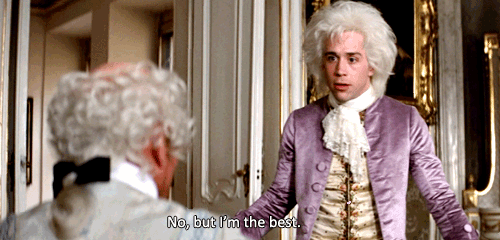
1. What do we expect to see and hear when we get to Salzburg.
In short, we will see a lot of history when we visit Salzburg, also fondly referred to as the “German Rome”, for its beauty and history. Of the musical sphere, we will be seeing and hearing the glockenspiel (this is the most German word I’ve ever seen) clocktower play us a tune that has been playing since Mozart’s time, and now plays his music. Personally, I am excited not only for the history of the city but also the located which is described as being at the foot of the Alps, (the Alps!!).
2. What was Colorado’s agenda? What changes did he want to make to music? Why do you think that is?
Colloredo’s agenda was to modernize Salzburg and change the education system and promote both the science and the arts. He made a few changes to music. First, his reforms limited traditional musical performances, he even outlawed instrumental and traditional litegury pieces and instead implemented the use of German Hymns. He may have jumpstarted this modernization to compete with surrounding cities that also had an interest in music and science.
3. Describe 2 performance or composition opportunities available in 18th century Salzburg.
They could play at the cathedral in various performance opportunities sometimes in groups as big as 40. It was mostly violionists and vocalists, with other popular instruments of the time (trumpets, woodwind) being played less frequently. They played at celebrations like during Christmas and New Years. Besides playing at the cathedral, musicians could also find opportunities to perform at the Benedictine university where they developed a unique orchestral genre called the orchestral serenade, which was used at the end of the school year during graduation ceremonies, much like our present-day Pomp and Circumstance, perhaps this was its origin.
4. How did Mozart’s compositions differ from his contemporaries? Specifically Michael Haydn.
His works deviated from the norm of Salzburg composers in a few ways. His compositions were more Italian in style, along with having disjunctive elements. It differs from Haydn’s compositions specifically in that where Haydn maintains a kind of predictive nature, Mozarts is described as being ambiguous. He uses a different layout of his compositions that Hayden used.
5. Eisen clearly is skeptical of the accounts of Mozart as a man of suffering and has tried to outline a counter-narrative to the popular trope. What are two reasons he gives for doubting that was the whole story? What questions do you have?
Eisen says that instead of believing that the Mozart’s were troubled musicians being mistreated by their employer, she asks us to consider that they themselves were also problematic employees. Also, she says that instead of thinking that Mozart was a neglected artist, maybe instead he was a rebel against the classical musicians before him, attempting to pave a new road. My main question regards how much money musicians made at the time, especially such skilled musicians, because I can’t imagine the Mozart family suffered in a finacial way.
2 notes
·
View notes
Text
Me when i’m listening to the Phantom of the Opera in my car and The Phantom say’s “ sing for me my angel of music”

9K notes
·
View notes
Text
Blog Post #6
The Genius of Mozart Summary
Mozart was born into a musical family, he was the youngest. He learned of his musical ability at a very young age, and his father supported him because he was a composer himself. He was sensitive to loud noises. He lived in Salzburg, Germany but left when he was 7 years old. His father invested a lot of money into moving so that they could pursue Mozart’s musical talent and education. Following the 7 years war, the aritocracy had money to invest into the arts, particularely music. His mother described him as being detached from reality.
Some believed Mozart was the mind of God come to embody a boy to produce music for the masses. He suffered from rhumetoid arthretis and malnutrition because their family traveled during winter and had little food. He kept performing though and eventually fell in love with a 16-year old singer, but left her to continue his traveling career. His mother died, and here we begin to see his music turn to Minor. He married someone named Constanze who his father and sister did not like and so they lost touch. But when Mozart created a new piano his father had to see it in use and they rekindled their relationship.
Ultimately, Mozart, from a very young age, was an astonishing musician, a true prodigy. His music was made not only for the elite of society but also the middle and poorer classes. Everyone could listen to his music and enjoy it. Because he started from such a young age he was able to advance his musical talents and compositions better than older musicians at the time. He died at age 35, I can only imagine how many more great compositions we would have today if he would’ve lived longer.
0 notes
Text
Blog Post #5
Bach Ch. 1
1. Bach from his childhood was extremely determined to showcase his musical abilities. He was known for being creative and a great improviser. He was frugal and did not lavish himself with expensive things in life. He enjoyed simplicity and was quite humble, in reference to shrinking from popular applause to his compositions.
Bach Family Tree
1. the 15th and 16th centuries
2. One of the articles said he had 2 wives and 20 children, and the article with the family tree said he only had 10 children
3. 2 of his children became leaders in music, and 2 others became musicians.
4. My father has played guitar for most of his life and has been active in bands throughout his life too. As for musical talent in relation to this classes musical focus, there is no one in my family that has been involved in orchestra or choirs that I know of.
Bach’s St. Matthew’s Passion
1. I think the tonality is in minor mostly because it sounds sad and from research Bach didn’t write a lot of modal music
2. First, there are just soloists and then the orchestra comes in and accompanies the singers
3. if this an oratorio then I assume it must be a musical performance with both singers and an orchestra, meant to be pretty grand with a lot going on.
4. I find this kind of music pretty entertaining just because there is so much going on and it’s really pretty.
Bach’s Concerto
1. The first movement is kind of fast, it is a tonality of minor, there’s no rubato which means that the tempo is pretty much consistent. I think it’s polyphonic because there’s a lot of melodies going on at once.
2. The second movement is a lot slower than the first one. The violins are the focus while the other instruments just follow along with a melody. It’s still in minor.
3. The third movement picks up speed more than the other movements before it. Within each movement there doesn’t seem to be any cadences, except between the movements, in other words, there doesn’t seem to be any clear ending of the phrases. Again, this movement is in minor.
1 note
·
View note
Text
Blog Post #4
Keith Polk
1. In medieval time there was an appreciation for musicians. They were supported by the public because there was evidence of them performing at parties where dancing was present. They also had some prestige and were often associated with the higher classes of the cities. They were often paid well, although sometimes their pay was not consistent and for a time period there were no records of musicians being paid at all. Additionally, the music scene was very fast paced, “one who was considered a good player in this area just five or six years ago doesn’t amount to a hill of beans now” (haha). From this, we can assume that although the musicians were being paid and valued, the fast-paced environment likely caused them stress because of the fear of being replaced and constantly having to practice and travel for work. Traveling musicians were sometimes regarded as nobles, representing their community. Some musicians wore medallions of authority and civic musicians were even exempt from paying taxes. With this evidence, we can assume that the professional lives of musicians was fairly lavish and enjoyable with salaries and associations with the elite of the communities, although the stress to always be improving was ever present.
2. We know what we know through records from the time. There is a lack of individual accounts regarding musicians, however tax records and chronicles cite the proof that musicians were paid in this time period. They also have records from scribes that attended musical performances that provide evidence of the kinds of instruments that were used at the time. There were also travel records that show when musicians entered towns. Illustrations provide us with the ability to see how instruments might’ve looked and thus allow us to track when new versions of instruments (like the sliding trombone) entered the scene. Salary lists provide us with evidence of musicians being paid, and records of taxation show us that some musicians were exempt.
Made in Nuremberg
3. The advancement of music and physics in Nuremberg took place after traders looked to metal smelting as a new way of making money. Many people began moving to Nuremberg to involve themselves in this advancement, such as Regiomontanus who came to Nuremberg to engage with the metal astronomical instruments being built. Albrecht Durer drew a math book with directions on how to design and construct sundials. There was even a sphere installed on the side of a church that showed the phases of the moon that is still accurate today (pretty cool!). One of Durer’s illustrations was even speculated to have inspired the famous astronomer Kepler to finding the solution of the pinhole problem in optics. Besides metal physics instruments, metal (brass) could be used to produce musical instruments. With the population boom due to the metal trade and scientific community flocking, there was also a boom of culture which also encouraged enjoyment of the arts which likely lead to a greater importance being placed on music and prestige being alloted to musicians.
Music in German-Speaking Territories
4. During the Reformation, Luther was interested in incorporating music into the liteargy because he wanted believers to be enaged in the service. This was different because other reformers at the time did not consider music to be important to religion. Luther composed some choral pieces and translatted latin choral pieces into German so that his congregation could actively participate in service.
Der Engel sprach zu den Hirten
5. I think the texture is polyphony because there are two apparent melodies going on at the same time.
6. I think the tonality is major because the song is pretty happy sounding. Also maybe consonance because it sounds relaxed and agreeable.
7. The subject of this piece is about Jesus’s birth and giving praise about it. I decided upon this after reading the translation of the lyrics.
8. This piece fits the description of a motet because it is polyphony and it also has a religious subject that is pretty general and can likely be sung in any service at anytime throughout the year, since it is just giving praise for Jesus coming.
1 note
·
View note
Text
Blog Post #3
1. The readings, By The Numbers: Female Composer, and Malcolm Gladwell’s Blink Chapter 7, sheds light on the history of gender inequality in the musical orchestra field both between composers and performers. This kind of gender equality was an unknown to me beforehand because growing up I did not pay attention to how many more males were on the stage than females when I attended orchestras performances for school. I think that the inequality described in By The Numbers was less surprising because high status is often associated with composers and until recently high status occupations were not held by women. However, in Chapter 7, Gladwell brought up the fact that women were often judged on their gender rather than their playing ability when auditioning for a chair in orchestras, which I had never known was a problem. Personally, due to patriachal gender norms, I’ve associated females with softer job fields such as nursing, teaching, and the arts. However, these articles taught me something new, that females have not only been kept out of science fields based on the assumptions that they cannot perform at the same level, an apparently also in musical fields. This does fit the gender bias that women don’t belong in hard science fields. My final reaction is that I am glad that we are overcoming these gender biases in this field and I am excited to support female performs and composers even more now, after learning that they have since struggled throughout history to earn their spot in a field that has for so long been male-dominated.
2. The fact I read that was the most interesting that she can be considered a witch, I assume this is related to her finding success in many aspects of her life from being a respectable nun, to a composer, to also authoring books about biology and medicine. Perhaps many found her intimidating and her successes could only be attributed to magic.
3. I think the texture of the piece is monophony because there is really just one voice that makes up the piece and the music is really just a singular tone in the background.
4. To me, this piece sounds as if it fits a minor tonality, meaning it is sad sounding. I think that it is slower and drawn out and kind of haunting, maybe sorrowful or longing. However, upon reading the translation this assessment is confusing because it is a pious piece and I don’t think that the intention was to make worship music sound sad, maybe just thoughtful and thankful. I also think the piece is modal because of the time period it was written in, it lacks much musical accompianant and the singing could be compared to chanting. I think I will need help identifying this piece’s tonality in terms of major and minor.
5. The title appears to come from the lyrics of the song in relation to the subject of the piece being God’s glory. The title is “O Power within Eternity” and the piece talks about creation and Jesus saving us and maybe the title is in reference to God’s power to be able to provide all these things to the human race.
6. This piece is about God’s glory and all the things he has provided to the human race through his grace like saving us of our sins through his son’s suffering. This subject is thankful and gracious, however the subject of Jesus’s suffering is kind of sad. I think that for the most-part this piece’s subject fits how it sounds, I think it sounds gracious with some sad undertones because the song does talk about suffering and sinning.
0 notes